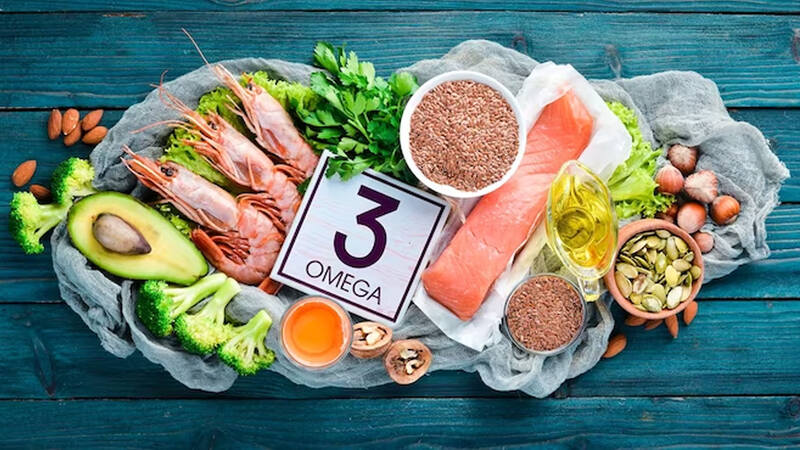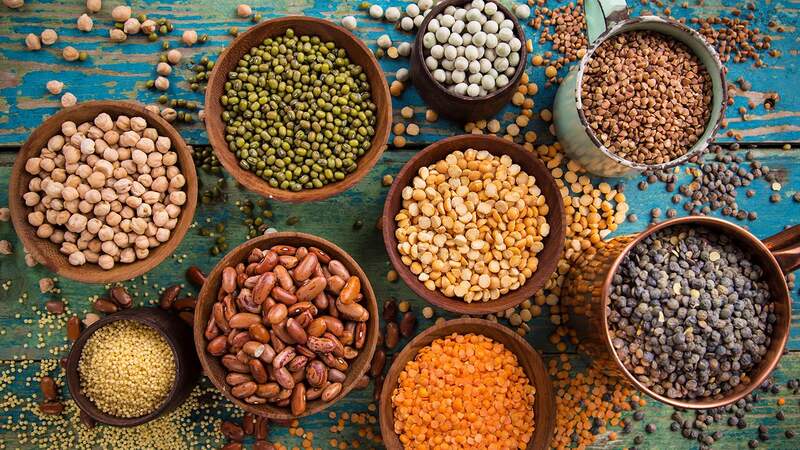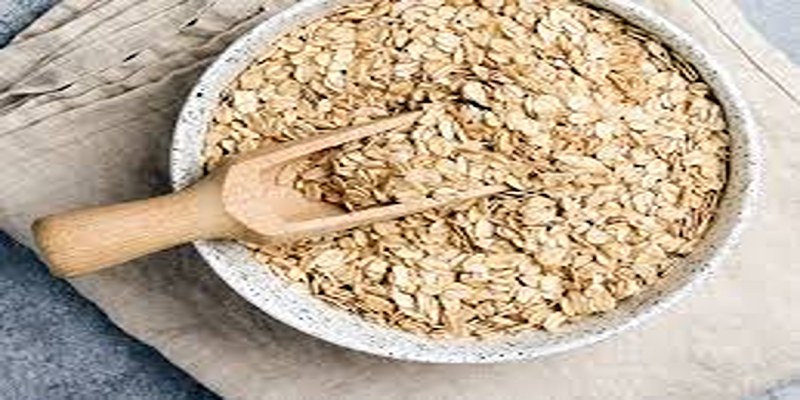Unlocking the Power of Cholesterol-Lowering Foods
Feb 09, 2024 By Nancy Miller
Overall well-being crucially hinges on maintaining healthy cholesterol levels. A balanced diet, in particular, pivots towards achieving this essential goal. This article delves into the exploration of eight seamlessly incorporable cholesterol-lowering foods for your daily meals. Empowering yourself with an understanding of these foods' benefits enables you to make informed choices for a lifestyle that promotes heart health.
1. Oats - A Hearty Start to Your Day
Incorporate oats into your breakfast for a heart-healthy start to the day. Rich in beta-glucans, they aid in reducing LDL cholesterol levels. Kickstart your morning with a warm bowl of oatmeal, topped with fresh fruits, and promote an optimistically positive impact on your cholesterol profile.
Consider a creative twist. For that, soak your oats overnight in yogurt or milk. Then, add an array of favorite nuts and berries. This approach not only offers convenience for breakfast but also guarantees diversity and nutrition. With their versatility, you can experiment with various toppings and flavors. This is a surefire way to keep your mornings exciting while promoting cardiovascular health.
- Consideration: Be mindful of the portion size when preparing oats. While they offer numerous health benefits, moderation is key to maintaining a balanced diet.
- Caution: Instant flavored oats may contain added sugars, so opt for plain oats and sweeten them naturally with fruits or a drizzle of honey.
2. Nuts and Seeds - Nature's Nutrient-Rich Gems
Almonds, walnuts, flaxseeds, and chia seeds are rich in healthy fats, fiber, and antioxidants. Incorporating a handful of these nutritionally dense nuts into your daily snack routine may lower cholesterol levels and bolster cardiovascular health.
Combine various nuts and seeds with dried fruits to create a wholesome trail mix. This provides an essential variety of nutrients. Notably, the inclusion of omega-3 fatty acids in your diet aids significantly in managing cholesterol levels. Whether you choose to sprinkle it over yogurt or enjoy it as a standalone snack. This small, but potent foodstuff can yield profound benefits for heart health.
- Consideration: Choose raw or lightly roasted nuts and seeds to preserve their nutritional value. Avoid varieties with added salt or excessive seasoning.
- Fact: Flaxseeds are not only rich in fiber but also contain lignans, compounds that may have additional heart-protective benefits.
3. Fatty Fish - Omega-3 Powerhouse
Salmon, mackerel, and trout being fatty fish, offer an excellent supply of omega-3 fatty acids. These vital fats actively reduce triglycerides. Moreover, they promote cardiovascular health. Ensure you integrate at least two servings of this delicious and effective cholesterol management strategy into your weekly diet.

Enhance the flavors of your fish by grilling or baking it with a drizzle of olive oil and sprinkling herbs. This method, maintaining not only nutritional integrity but also adding an extra layer of heart-healthy goodness is both effective and enticing. To ensure consistently exciting yet nutritious meals: experiment extensively with diverse fish recipes.
- Consideration: Be cautious about mercury levels in certain types of fish. Opt for varieties that are lower in mercury, especially if you are pregnant or nursing.
- Fact: Omega-3 fatty acids are essential for brain health, making fatty fish a double-edged sword for overall well-being.
4. Fruits and Berries - Natural Sweetness, Lower Cholesterol
Apples, berries, and citrus fruits though vibrant with color are not just delicious. They also play a significant role in managing cholesterol. Soluble fiber and antioxidants abound within these fruits are powerful allies that assist in reducing LDL cholesterol levels. Whether you choose to snack on them or incorporate their goodness into your salads, it's a flavorful heart-healthy boost either way!
Enjoy a diverse array of flavors and nutritional benefits by incorporating seasonal fruits into your diet. Consider indulging in some delicious options, such as apple slices with almond butter or a refreshing mixed berry salad. The possibilities to integrate fruits seamlessly into your daily routine are truly limitless. Not only does their natural sweetness gratify cravings, but it also actively promotes heart health.
- Caution: Fruit juices may lack the fiber found in whole fruits, so it's preferable to consume fruits in their natural form.
- Fact: The fiber in fruits not only aids in cholesterol reduction but also promotes a healthy digestive system.
5. Olive Oil - Liquid Gold for Heart Health
In your cooking, substitute saturated fats with heart-healthy olive oil. Olive oil is abundant in monounsaturated fats and antioxidants. It can reduce LDL cholesterol levels. Whether you drizzle it over salads or use it for cooking, this nutritional enhancement supports cardiovascular well-being.
To create a flavorful salad dressing, combine olive oil with balsamic vinegar, garlic, and a dash of herbs. This infusion not only heightens the taste of your salads, it also introduces an element that is heart-protective antioxidants. Endeavor to experiment with various olive oil varieties. You will unearth nuanced flavors that perfectly harmonize with different dishes in your repertoire for heart-healthy cooking.
- Consideration: Extra virgin olive oil retains more antioxidants and has a richer flavor compared to lighter varieties.
- Caution: While olive oil is a healthy fat, moderation is key, as it is calorie-dense. Stick to recommended serving sizes.
6. Legumes - Fiber-Rich Champions
Nutritional powerhouses like beans, lentils, and chickpeas offer a substantial dose of soluble fiber. This fiber binds to cholesterol. Include legumes in your diet through soups, stews, or salads for an effective and delicious method for managing cholesterol levels.

Engage in the exploration of diverse and nutritious legume-based dishes, for instance: lentil soup or chickpea curry. Notably rich in fiber, an element that bolsters heart health while fostering satiety, thus facilitating healthy weight management. Legumes prove versatile additions to both vegetarian and non-vegetarian diets by boosting protein intake and enhancing dietary fiber content.
- Fact: Legumes are an excellent source of plant-based protein, making them a valuable component of vegetarian and vegan diets.
- Caution: If you're not used to consuming legumes regularly, introduce them gradually to avoid digestive discomfort.
7. Green Tea - Sip Your Way to Heart Health
Not merely a refreshing beverage, green tea also presents catechins which are powerful antioxidants. Scientists have correlated these compounds to reduced levels of LDL cholesterol. Integrate green tea into your daily regimen. Relish its potential advantages and nurture the well-being of your heart all at once!
Savor the complete flavor and advantages of green tea. Brew it at a lower temperature. Engage in experiments with various varieties, matcha or jasmine green tea, for instance, to unearth your preferences. Establish a ritual where you relish an after-meal cup of heart-protective, soothingly warm green tea, thus concluding each dining experience on an elevated note.
- Fact: Green tea contains less caffeine than coffee, making it a suitable option for those looking to reduce their caffeine intake.
- Consideration: It's advisable to limit added sugars or high-calorie additions to your green tea to maximize its health benefits.
8. Dark Chocolate - Indulgence with Heart Benefits
End your cholesterol-lowering journey on a delightful note by adding dark chocolate in moderation. It's rich in flavonoids. Opt for varieties containing at least 70% cocoa content. This heart-conscious treat comes with no guilt attached!
Indulge in dark chocolate mindfully. Fully savor its complex flavors. Pair it with a handful of nuts. This heart-healthy combination will not only satisfy your palate but also contribute to the robustness of your cardiovascular system. Indeed, incorporating dark chocolate as an occasional treat can reward you by appeasing sweet cravings and promoting overall cardiovascular health.
- Caution: While dark chocolate offers health benefits, moderation is crucial due to its calorie content.
- Fact: The antioxidants in dark chocolate may contribute to improved blood flow and lower blood pressure.
Conclusion
Embrace a diverse and colorful plate. Prioritize your heart's well-being with these wholesome food choices. Incorporate cholesterol-lowering foods into your daily diet as a proactive step towards maintaining cardiovascular health. From oats to dark chocolate, each item contributes unique benefits in managing cholesterol levels. Savor the flavors, and let an overall strategy for heart-healthy eating guide you.

Uncovering the Health Benefits of Onions: Nutrition and Wellness Guide

Pasteurization Debate: Assessing Nutrient Loss in Processed Foods

Unlocking the Power of Cholesterol-Lowering Foods

Is It Safe to Work Out While You're Fasting: All you Need to Know

Ready to Try Backbends? Start Here for a Safe and Energizing Practice

Exploring the Health Benefits of Oatmeal: A Nutrient-Rich Breakfast Choice

Six Health Benefits of Litchi: Reasons to Include Them in Your Diet


